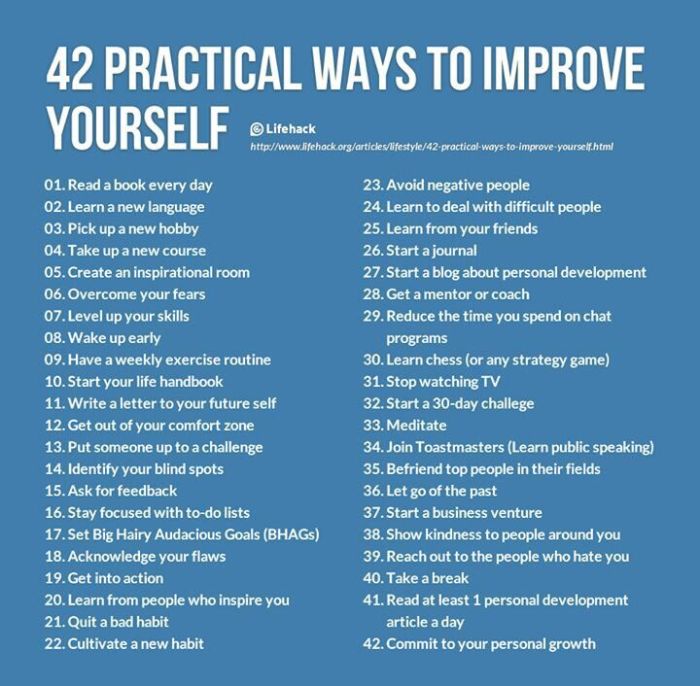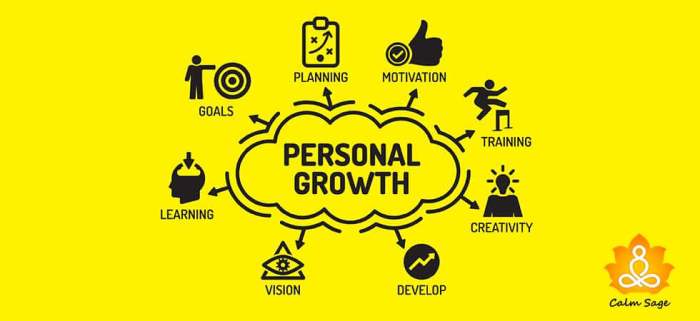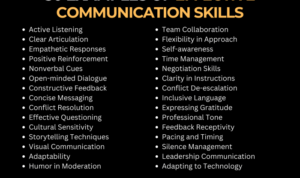Self-Improvement Tips: Ready to level up your game? Dive into the world of self-improvement with these expert-backed strategies that will help you unlock your full potential.
From setting SMART goals to cultivating a growth mindset, this guide will take you on a journey towards personal growth and success.
Definition of Self-Improvement: Self-Improvement Tips

Self-improvement is the conscious effort to enhance one’s skills, knowledge, habits, or overall well-being in order to reach personal goals and achieve a higher level of success and fulfillment in life.
Examples of Self-Improvement Goals
- Learning a new language to broaden communication skills.
- Developing a consistent exercise routine for better health and fitness.
- Improving time management skills to increase productivity.
- Working on cultivating a positive mindset for mental well-being.
The Importance of Self-Improvement in Personal Growth
Self-improvement plays a crucial role in personal growth as it allows individuals to continuously evolve, learn, and adapt to new challenges and opportunities. By setting and achieving self-improvement goals, individuals can boost their confidence, increase their motivation, and ultimately lead a more fulfilling and successful life.
Self-Reflection
Self-reflection plays a crucial role in the journey of self-improvement as it allows individuals to introspect, identify areas for growth, and track progress towards personal development goals.
The Significance of Self-Reflection
Self-reflection provides an opportunity for individuals to pause, evaluate their thoughts and actions, and gain insights into their behaviors and beliefs. It helps in fostering self-awareness, which is essential for personal growth and improvement.
Methods for Effective Self-Reflection
- Journaling: Writing down thoughts, feelings, and experiences can help individuals gain clarity and identify patterns in their behavior.
- Mindfulness Practices: Engaging in mindfulness meditation or other mindfulness techniques can aid in becoming more present and aware of one’s thoughts and emotions.
- Seeking Feedback: Asking for feedback from trusted individuals can provide valuable insights and perspectives that may not have been considered otherwise.
How Self-Reflection Helps in Setting Realistic Goals
Self-reflection allows individuals to assess their strengths, weaknesses, and values, which in turn helps in setting realistic and achievable goals. By understanding oneself better, individuals can set goals that align with their aspirations and capabilities, increasing the likelihood of success.
Setting SMART Goals

Setting SMART goals is a key component of self-improvement. SMART goals are Specific, Measurable, Achievable, Relevant, and Time-bound objectives that help individuals focus their efforts and track their progress effectively.
Examples of SMART Goals
- Health & Fitness: Run a 5k race in under 30 minutes by the end of the year.
- Career: Obtain a professional certification within the next 6 months to advance in my current job.
- Personal Development: Read one self-help book every month for the next year to enhance my knowledge and skills.
Aligning SMART Goals with Personal Values
Aligning SMART goals with personal values is crucial for long-term motivation and fulfillment. By setting goals that resonate with your core beliefs and principles, you are more likely to stay committed and dedicated to achieving them.
When setting SMART goals, reflect on what truly matters to you and how your objectives align with your values and aspirations.
Time Management
Time management is a crucial aspect of self-improvement as it allows individuals to make the most out of their day, ensuring that they are able to allocate time effectively to work towards their personal goals and development. By mastering time management, individuals can reduce stress, increase productivity, and create a sense of accomplishment in their daily lives.
Strategies for Effective Time Management
- Set clear goals: Define what you want to achieve and break down tasks into smaller, manageable steps.
- Use a planner or calendar: Organize your schedule and prioritize tasks based on deadlines and importance.
- Avoid multitasking: Focus on one task at a time to ensure better quality and efficiency.
- Eliminate distractions: Identify and remove anything that may hinder your focus and productivity.
- Take regular breaks: Allow yourself short breaks to recharge and maintain concentration throughout the day.
Prioritizing Tasks for Personal Development, Self-Improvement Tips
- Identify important tasks: Determine which tasks align with your long-term goals and prioritize them accordingly.
- Set deadlines: Establish clear deadlines for each task to create a sense of urgency and accountability.
- Delegate when possible: Assign tasks to others to free up time for activities that contribute more directly to your personal growth.
- Reflect on achievements: Celebrate small wins and reflect on your progress to stay motivated and on track.
Healthy Habits
Developing and maintaining healthy habits is crucial for self-improvement. These habits not only have a positive impact on physical health but also contribute significantly to mental well-being.
List of Healthy Habits:
- Eating a balanced diet rich in fruits, vegetables, and whole grains.
- Regular physical exercise to keep the body active and healthy.
- Getting an adequate amount of sleep each night for rest and rejuvenation.
- Staying hydrated by drinking plenty of water throughout the day.
- Practicing mindfulness and stress-reducing activities like meditation or yoga.
Impact of Physical Health on Mental Well-being:
Good physical health directly impacts mental well-being by reducing stress, improving mood, and enhancing cognitive function. When the body is healthy, the mind also functions better, leading to increased productivity and overall well-being.
Tips for Developing and Maintaining Healthy Habits:
- Start small and gradually incorporate healthy habits into your routine.
- Set specific goals for each habit and track your progress regularly.
- Stay consistent and make healthy choices a part of your lifestyle.
- Find a support system or accountability partner to help you stay motivated.
- Reward yourself for sticking to healthy habits to reinforce positive behavior.
Growth Mindset
A growth mindset is the belief that abilities and intelligence can be developed through dedication and hard work, rather than being fixed traits. It plays a crucial role in self-improvement by fostering resilience, adaptability, and a willingness to learn from failures.
Cultivating a Growth Mindset
To cultivate a growth mindset, one can start by embracing challenges and viewing them as opportunities for growth. Learning from criticism and feedback, as well as seeking out new experiences and perspectives, can also help in developing a growth mindset.
- Embrace challenges and see them as opportunities for growth.
- Learn from criticism and feedback to improve continuously.
- Seek out new experiences and perspectives to expand your knowledge and skills.
Examples of Personal Development with a Growth Mindset
Having a growth mindset can lead to personal development in various ways. For instance, someone with a growth mindset may be more willing to take on new challenges, learn from setbacks, and persist in the face of obstacles. This can result in increased resilience, confidence, and overall growth in skills and abilities.
- Taking on new challenges and learning from setbacks to grow and improve.
- Persisting in the face of obstacles and setbacks to achieve personal development goals.
- Increasing resilience, confidence, and skills through a growth mindset approach.












